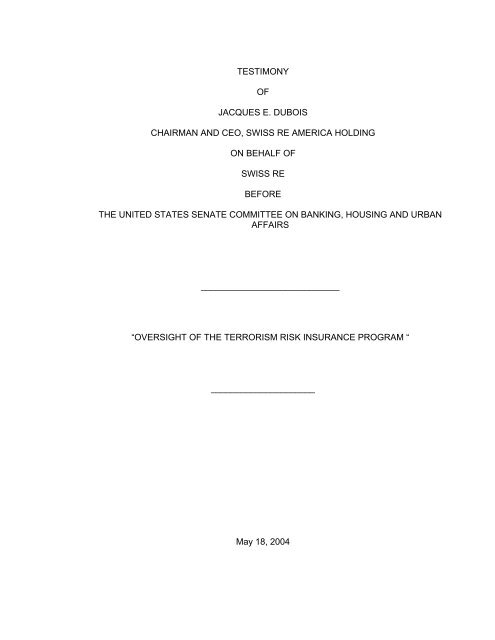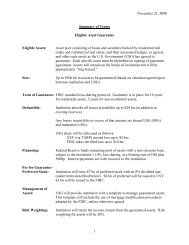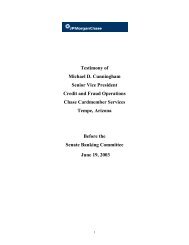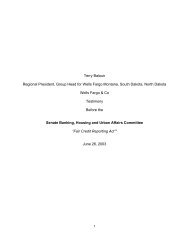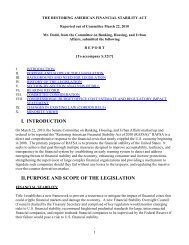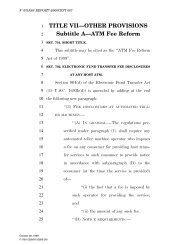testimony of jacques e. dubois chairman and ceo, swiss re america ...
testimony of jacques e. dubois chairman and ceo, swiss re america ...
testimony of jacques e. dubois chairman and ceo, swiss re america ...
You also want an ePaper? Increase the reach of your titles
YUMPU automatically turns print PDFs into web optimized ePapers that Google loves.
TESTIMONYOFJACQUES E. DUBOISCHAIRMAN AND CEO, SWISS RE AMERICA HOLDINGON BEHALF OFSWISS REBEFORETHE UNITED STATES SENATE COMMITTEE ON BANKING, HOUSING AND URBANAFFAIRS____________________________“OVERSIGHT OF THE TERRORISM RISK INSURANCE PROGRAM “_____________________May 18, 2004
Good morning Chairman Shelby, Ranking Member Sarbanes, <strong>and</strong> Members <strong>of</strong> theCommittee. My name is Jacques Dubois <strong>and</strong> I am Chairman <strong>and</strong> CEO <strong>of</strong> Swiss Re AmericaHolding Corporation.We have filed written <strong>testimony</strong> for the <strong>re</strong>cord. Thank you for your leadershipon this urgent matter <strong>and</strong> for giving us this opportunity to comment <strong>re</strong>garding the Terrorism RiskInsurance Act.First, a few words about Swiss Re. Founded in Zurich, Switzerl<strong>and</strong> in 1863, Swiss Re hasinsu<strong>re</strong>d risks in the US since 1880. Today Swiss Re has global <strong>re</strong>venues <strong>of</strong> approximately $28billion <strong>and</strong> total assets <strong>of</strong> $130 billion. Swiss Re is the world’s second largest <strong>re</strong>insu<strong>re</strong>r <strong>and</strong> theworld’s largest life <strong>and</strong> health <strong>re</strong>insu<strong>re</strong>r <strong>and</strong> is also North America’s largest <strong>re</strong>insu<strong>re</strong>r. Our companyinsu<strong>re</strong>s risks globally, operating from 70 <strong>of</strong>fices in 30 countries. We employ 2300 people in the US<strong>and</strong> 9000 worldwide. We a<strong>re</strong> also members <strong>of</strong> the Reinsurance Association <strong>of</strong> America <strong>and</strong> theAmerican Council <strong>of</strong> Life Insu<strong>re</strong>rs.Mo<strong>re</strong> to the point <strong>of</strong> today’s hearing, Swiss Re has <strong>re</strong>sponded to virtually every major UScatastrophe over the last 100 years. In fact, for Swiss Re, prior to 9/11, our largest single loss<strong>re</strong>lative to capital was the San Francisco earthquake in 1906. Swiss Re plays an important role inthe US insurance industry <strong>and</strong> is active in discussions <strong>re</strong>garding terrorism risk <strong>and</strong> terrorism losses.Our 9/11 claims totalled $3.3 billion <strong>and</strong> we we<strong>re</strong> the largest insu<strong>re</strong>r <strong>of</strong> the World Trade Center.Although <strong>re</strong>insurance is not subject to TRIA, Swiss Re has a keen inte<strong>re</strong>st in the law for two<strong>re</strong>asons:• First, US terrorism risk stems, in large measu<strong>re</strong>, from terrorists’ efforts to influencegovernment policy. Terrorist attacks seek to undermine US institutions <strong>and</strong> cultu<strong>re</strong>. Prior toSeptember 11 terrorism had not been perceived as a significant risk. But 9/11 demonstrated theenormous potential for loss caused by terrorist attacks. We feel very strongly that government must2
play a partnership role with the insurance industry in coping with these losses. Insu<strong>re</strong>rs, <strong>re</strong>insu<strong>re</strong>rs,property owners, business owners, employees <strong>and</strong> government <strong>and</strong> its institutions – all <strong>of</strong> us a<strong>re</strong> atrisk for terrorism.• Second, in short, TRIA has worked. TRIA has provided protection to insu<strong>re</strong>rs that limitslosses in the event <strong>of</strong> an additional terror attack. This has allowed insu<strong>re</strong>rs to perform theirtraditional roles in bearing risks against losses from perils that the industry can effectively price <strong>and</strong>underwrite such as hurricanes, floods, fi<strong>re</strong>, auto accidents <strong>and</strong> other events.As a <strong>re</strong>insu<strong>re</strong>r, we a<strong>re</strong> not <strong>re</strong>qui<strong>re</strong>d to provide terrorism <strong>re</strong>insurance coverage. And, for the mostpart, we do not now provide terrorism <strong>re</strong>insurance because we cannot quantify the f<strong>re</strong>quency orseverity <strong>of</strong> possible events. The<strong>re</strong> a<strong>re</strong> a few exceptions:• We provide partial protection for clients in containing their TRIA <strong>re</strong>tention exposu<strong>re</strong>.• We provide modest catastrophe cover for our group life clients.In both cases, what we provide is a fraction <strong>of</strong> what our customers need <strong>and</strong> want <strong>and</strong> what we hadprovided prior to 9/11.What these two exceptions have in common is that we can quantify our maximum exposu<strong>re</strong>. Toaccept risk without fully underst<strong>and</strong>ing our exposu<strong>re</strong> would be ir<strong>re</strong>sponsible to our sha<strong>re</strong>owners <strong>and</strong>to our customers.The impossibility <strong>of</strong> p<strong>re</strong>dicting f<strong>re</strong>quency <strong>and</strong> severity <strong>of</strong> terrorism attacks is the primary <strong>re</strong>ason whythe <strong>re</strong>insurance market has been cautious in <strong>of</strong>fering terrorism risk protection. Although much workhas been done on models to assess terrorism risk, fo<strong>re</strong>casts <strong>of</strong> the f<strong>re</strong>quency <strong>and</strong> the magnitude <strong>of</strong>terrorism losses a<strong>re</strong> ext<strong>re</strong>mely problematic. Statistical data is simply unavailable to begin to quantify3
association for the life insurance <strong>and</strong> financial service industry, has also <strong>re</strong>leased a study on terroristevents such as a smallpox attack that could <strong>re</strong>sult in deaths in excess <strong>of</strong> 30 million. Just as with9/11, these losses have not been facto<strong>re</strong>d into insurance prices <strong>and</strong> cannot be absorbed within theindustry’s capacity.This issue is extraordinarily complex. We know that if a major terrorism event we<strong>re</strong> to occur, it wouldlikely hit several insurance lines <strong>of</strong> business simultaneously, as illustrated by the WTC event. TheSeptember 11 tragedy caused insu<strong>re</strong>d losses in individual life, group life, aviation, property, businessinterruption, worker’s compensation, <strong>and</strong> accidental death. In the light <strong>of</strong> these uncertainties, ourcautious approach toward terrorism risk is dictated by our <strong>re</strong>sponsibility to our sha<strong>re</strong>holders, clients<strong>and</strong> employees.We urge you to pass a 2-year extension <strong>of</strong> TRIA. The extension will allow TRIA to continue toprovide protection to the insurance <strong>and</strong> <strong>re</strong>insurance industry as well as to provide additional time toassess terrorism risk.Certain group life writers have petitioned for inclusion <strong>of</strong> group life insurance in TRIA. We supporttheir petition.Adding group life to TRIA will provide group life insu<strong>re</strong>rs the protection they need toinsu<strong>re</strong> the lives <strong>of</strong> people in the workplace. Group life insu<strong>re</strong>rs a<strong>re</strong> not f<strong>re</strong>e to manage their riskthrough terrorism exclusions. State <strong>re</strong>gulators will not allow it. As a public policy matter, state<strong>re</strong>gulators have decided that this basic insurance now covering 158 million Americans is vital. The<strong>re</strong>gulators a<strong>re</strong> right. Group life should be included in TRIA. In fact, Swiss Re believes that individuallife insurance should also be included but we await the conclusions <strong>of</strong> the R<strong>and</strong> Corporation <strong>and</strong> UST<strong>re</strong>asury studies.In closing, Cong<strong>re</strong>ss should extend TRIA for an additional two-year period. Swiss Re is committed toworking with the Federal Government to develop solutions that involve all stake holders. In the5
weeks <strong>and</strong> months following 9/11, Swiss Re met with members <strong>of</strong> Cong<strong>re</strong>ss <strong>and</strong> the US T<strong>re</strong>asury todiscuss possible approaches to this challenge. We <strong>re</strong>commended that the federal governmentconsider adopting the UK’s working solution, Pool Re. Pool Re <strong>and</strong> other solutions should again beconside<strong>re</strong>d. We believe that a public-private partnership between the federal government, industry<strong>and</strong> insu<strong>re</strong>d parties is the best way to deal with the risks involved. We believe government has anongoing role <strong>and</strong> <strong>re</strong>sponsibility due to the <strong>re</strong>lationship between government policy <strong>and</strong> themotivations <strong>and</strong> actions <strong>of</strong> terrorists.Thank you.6


